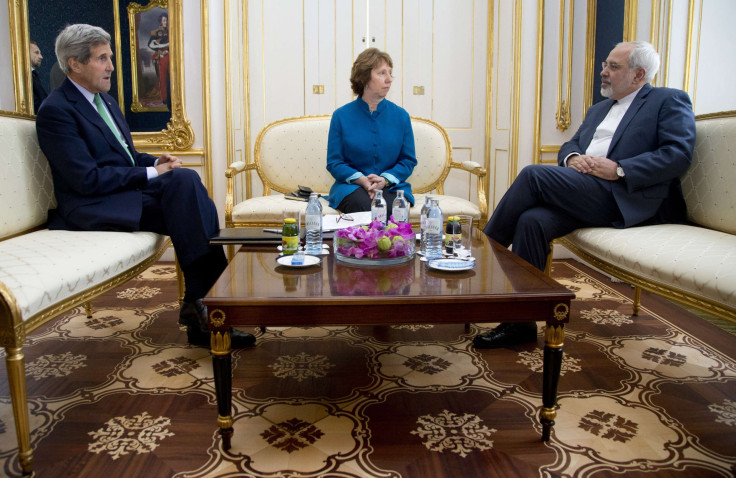Iran Nuclear Talks: US, World Leaders Down To Wire On Sanction Negotiations

For almost a year, the U.S. and other world powers have been negotiating with Iran, trying to ensure that the Islamic Republic does not use its nuclear program to develop weapons. The deadline for striking a deal with Iran is now just one month away, on Nov. 24. Experts say the most likely outcome is that there won't be a deal, and the current sanctions imposed on Iran by the U.S. and the European Union will remain in place.
“We have made impressive progress on issues that originally seemed intractable,” Undersecretary of State Wendy Sherman, the U.S. chief nuclear negotiator with Iran, said at a meeting at the Center for Strategic and International Studies on Thursday. “We have cleared up misunderstandings and held exhaustive discussions on every element of a possible text. However, like any complicated and technically complex diplomatic initiative, this is a puzzle with many interlocking pieces.”
One reason cited for the no-deal scenario is that one of the lead negotiators, EU Foreign Policy Chief Catherine Ashton, is set to step down from her position Nov. 1, removing a key player from the talks. The British diplomat may stay on in her current role if the Nov. 24 deadline is not met.
"There is a strong case to be made that there will be a deal, it is just a question of when," Alan Keiswetter, a retired senior foreign service officer, said. "If I were looking for a date ... the time would be January. The principal issue at this time is not in our court, it is in the Iranian court."
A deal on lifting or suspending sanctions in exchange for halting Iranian nukes is one of the most important foreign policy issues of Barack Obama's presidency, and the White House may choose to bypass Congress if such an agreement is reached -- a possibility first broached by the New York Times.
"If agreement is reached, President Obama will do everything in his power to avoid letting Congress vote on it," the Times wrote. Several members of Congress, known colloquially on the Hill as "sanction mongers," have sponsored legislation that seeks to impose even harsher sanctions on Iran.
One of those members of Congress is Senate Foreign Relations Committee Chairman Robert Menendez, a Democrat from New Jersey. He told the Times that “if a potential deal does not substantially and effectively dismantle Iran’s illicit nuclear weapons program, I expect Congress will respond."
“Without getting into the details, it nonetheless appears that the president can waive most if not all sanctions against Iran for the remaining two years of his term if he is willing to make the requisite findings. If he does so, what are the implications for any nuclear deal with Iran? Answer: The deal will be tenuous,” former Bush administration official and critic Jack Goldsmith said.
According to Akin Gump, a Washington-based law firm that specializes in international trade, in January the State and Treasury departments said the U.S. planned to suspend certain sanctions against Iran that were included in the original Joint Plan of Action drafted in Nov. 2013 by the U.S., U.K., France, Russia, China and Germany -- the negotiating group known as “P5+1” -- and Iran.
Under that plan, Iran committed to scaling back its uranium enrichment activities and permitting so-called "enhanced monitoring"of its nuclear program. In exchange, the P5+1 agreed to suspend certain sanctions and to forgo imposing new nuclear-related ones against Iran for a defined six-month period, according to a summation of the agreement provided by Akin Gump.
In January 2014, in accordance with that agreement, the U.S. eased some sanctions. Those dealt with the purchase of Iranian crude oil; exports of petrochemical products from Iran; the provision of automotive goods and services to Iran; the trade in gold or precious metals; the supply of commercial aviation parts and services to Iran, and humanitarian and tuition assistance.
In July, all parties agreed to extend the January agreement, and set a deadline for a final deal on Nov. 24, 2014.
According to several experts, if that deadline is met and a deal reached, some sanctions will be suspended that could affect Iran's biggest nuclear sites, Natanz and Fordow, where the country's uranium fuel is enriched, and a reactor that could produce weapons-grade plutonium.
Under the current deal, Iran cannot make any further advances at the Arak, Natanz and Fordow nuclear facilities. Iran is also required to allow inspections at these facilities.
If some of the sanctions were suspended in a deal, however, Iran could resume its programs at these facilities. The conditions would include continued monitoring and evaluation by the U.N. International Atomic Energy Agency, and limitations on just how many uranium-enriching centrifuges Iran will be allowed to spin.
"My own view is there are elements of a deal there," Keiswetter said. "The end result is what is important and there are various paths to get there."
© Copyright IBTimes 2025. All rights reserved.





















